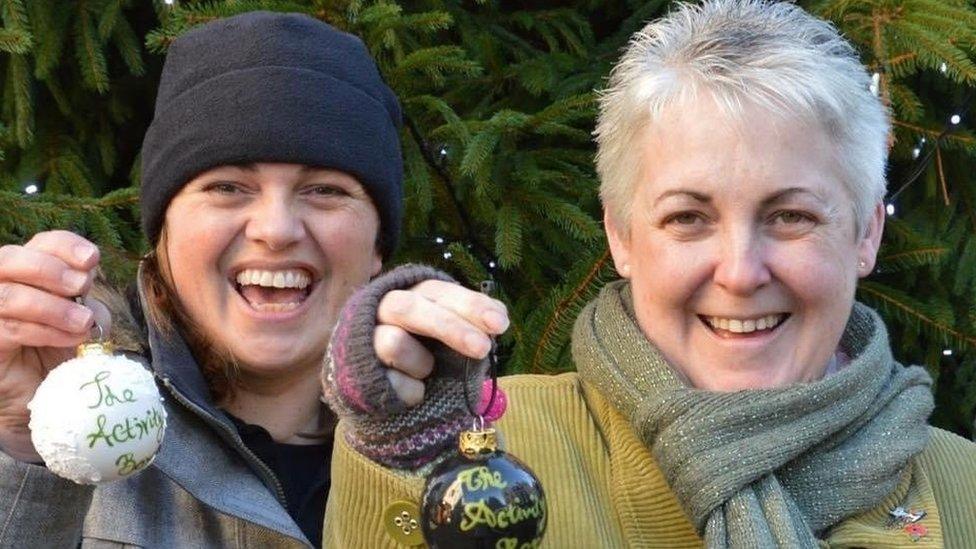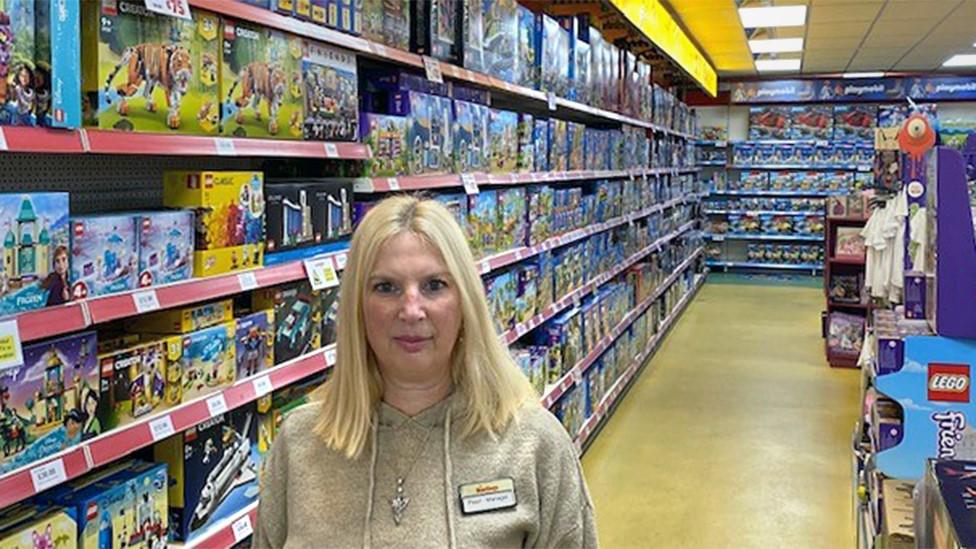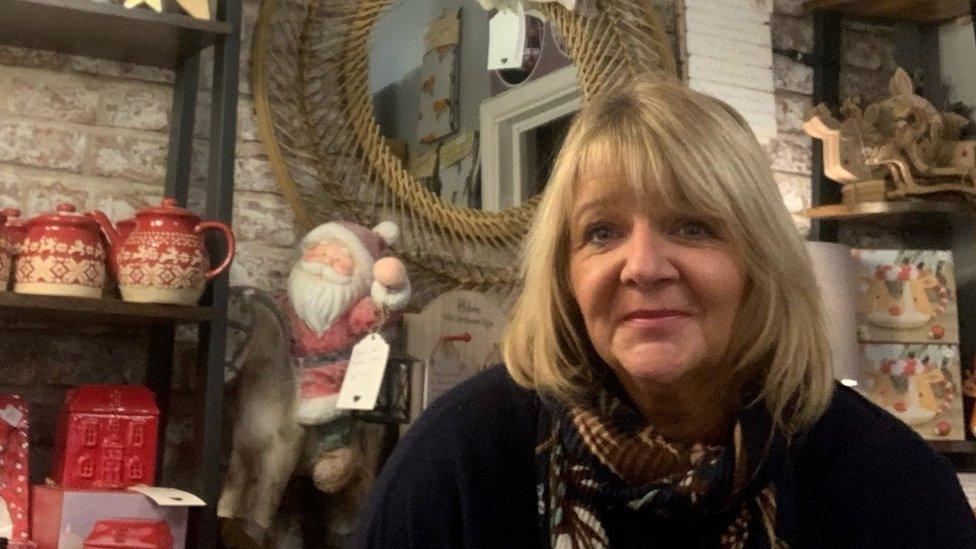Christmas savings clubs help spread the festive costs
- Published

Kellyann Eskisan has been paying for her children's Christmas presents over several weeks
Gifts for her children are already sitting in bags ready for Kellyann Eskisan at The Activity Box in Herne Bay, Kent.
She chose them weeks ago but is paying for them over several weeks as part of the craft shop's Christmas club.
"It's been a godsend," says Kellyann. "I just put in whatever I've got spare. Sometimes it's £5 or £10 - whatever I can afford when I'm passing the shop."
While Christmas clubs have long been a way of saving for the festive period, some small businesses, like The Activity Box, are offering them for the first time as the rising cost of living puts pressure on family budgets.
"If I was putting that money in my bank account, I'd just end up using it for something else and never paying it back," says Kellyann.
Customers can spread the cost however they choose, but only take home the gifts they've paid for when it gets to mid-December.
Abi Calder, who co-owns the shop, says they've already decided to continue offering the same thing throughout the year.
"The economic crisis isn't going away overnight. We know people are worried about their bills," she says, adding that as well as helping customers budget, it's good for the business too. "If we've got money coming in, we can replenish stock," she says.

The Activity Box co-owners Abi Calder (left) and Barbara Johnson say running the Christmas club helps their customers and benefits the business too
Sharron Marriott, who runs gift shop Make a House a Home in Whitchurch, Shropshire, says trust is a big reason her customers are choosing to save with local shops like hers.
"They know who you are, you're approachable. People like the personal touch," she says, adding that she's seen an uptick in the number of people saving for Christmas with her this year.
It's a feeling echoed by Pearl Norton, who has had a Christmas club for many years at her toy shop, Starlings, in Dereham, Norfolk.
"Normally we get the same people joining, but different people are doing it now," she says. "We all know it's going to be a hard year, we are just trying to do our bit."
Customers are asked to put down a 20% deposit on whatever they'd like to buy, and to pay the balance in full by 15 December.
In return, Pearl says they get the reassurance that what they want is put aside for them so won't suddenly go out of stock.
"Interest rates are rocketing. As long as they keep to their terms and conditions, we don't charge anything," she says.

Pearl Norton says a wider range of people are joining her Christmas club this year as the cost of living bites
The average household spends an extra £740 in December, according to the Bank of England.
Christmas clubs are just one way of saving for the festive period.
"They can be useful for people who like to lock their money away so they don't spend it," says Royal London's consumer finance specialist Sarah Pennells.
But she explains there can be drawbacks too, and says consumers should be aware the rules suit them.
"You may not be able to call on those savings if you have an emergency earlier in the year," she says, adding that where and when you can spend the money can also be restricted.
"If you're given a gift card, check the expiry date. We do know that lots of money is left on gift cards that expire," she says.
Crucially, the money isn't covered by the Financial Services Compensation Scheme the way it is if you save in a bank or a building society. That means it isn't protected if the company you're saving with goes out of business.
Earlier this year, the government announced plans to change the law so that cash held in savings club companies is protected, even if the company goes bust.
It aims to prevent a repeat of the Farepak scandal in 2006, external when tens of thousands of people lost their money when the Christmas hamper club collapsed into administration.
Sarah Pennells says it's a welcome move.
"People are trying to do the right thing - budgeting throughout the year - but actually don't get the same protection as someone who saves in a bank or building society, and that hasn't felt right at all."
It's unclear whether small firms like Abi's and Sharron's that operate clubs more informally would be affected by this law.

Trust is a big reason why customers choose to save with local shops, says Sharon Marriott
Some of the larger firms, such as Park Christmas Savings, already offer security by holding their customers' money in an independent trust.
"There's a preconception that it's older people who use Park," says the firm's director of marketing, Katherine Scott. "But typically it's women in their 30s, those with growing families."
While the vast majority of Park's 400,000 savers start putting money away at the beginning of the year, this year Park found there was an unusual spike in August.
"I think that was the time that the cost of living was really hitting people, especially with the increase in energy bills," Katherine explains.
Park customers receive vouchers at the end of the year that they can spend in a range of high street stores. Its data so far suggests a shift away from luxury items towards essentials.
"Our customers tell us openly who they want to shop with," explains Katherine. "This year, it's very much been the discount retailers - the likes of Aldi, B&M and Home Bargains.
"There's a definite sway to trying to find the best price, and using what funds they have to buy essentials."


Many of the major supermarkets run their own Christmas savings clubs, often with incentives like a bonus depending on the total amount saved.
Sainsbury's says it has seen a 48% increase in the number of people signed up for its Christmas club this year.
Having saved with both The Activity Box and Park, Kellyann is already planning for next Christmas.
She's opened her Park account early so that she can spread the cost over an even longer period.
"It makes life a lot easier," she says. "I don't have to worry about having the money there and then to pay for a pricey item. Knowing that it's there, and I've got the chance to pay it off is really helpful."